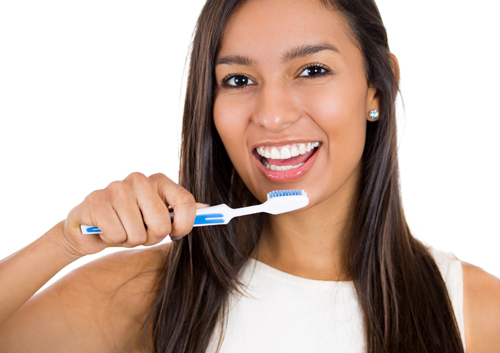Three Signs You May Have Gingivitis
February 19th, 2026

Gingivitis, or inflammation of the gums, is an early stage of gum disease. If you have gingivitis, it’s important to visit Drs. Peter Vogel, Vijal Vadecha to get proper treatment, since home care isn’t enough to get rid of the plaque that leads to tartar and eventually to gum disease. Monitor yourself to see if you have these signs of gingivitis, and get help as soon as you can to prevent the progression to periodontitis. Your vigilance could save your teeth.
1. You have one or more risk factors.
Having risk factors for gingivitis doesn’t mean that you have or will get the disease, but it does mean that you should be especially watchful. You’re more likely to get gum disease if you have the following risk factors:
- You are a smoker.
- You are a female going through puberty, pregnancy, or menopause.
- You have diabetes.
- You have a compromised immune system, as is the case if you have HIV/AIDS.
- You have a family history of gum disease.
2. You have inflammation in your gums.
Gingivitis is inflammation of the gums, and that is a tell-tale sign of the condition. Gingivitis or periodontitis can involve a bacterial infection, and inflammation is your body’s response to an injury or infection. The four standard signs of inflammation are pain, redness, swelling, and a higher temperature than normal.
If you have inflammation around your teeth, your gum disease may have progressed to the more serious condition of periodontitis. Drs. Peter Vogel, Vijal Vadecha can evaluate your case using a scope, or small ruler. The ruler is used to measure the pockets around your teeth, with a depth of one to three millimeters being normal.
3. Your teeth seem to be moving around.
Loose teeth are a classic sign of periodontitis. You may also have them if you have gingivitis. They can occur when your gum line recedes, or as the result of having soft bone in your jaw.
You might also notice other signs of your teeth moving around. For example, they may seem to be oddly spaced, or they could be separating from each other. You might also notice that your partial dentures don’t fit properly anymore, even if they’re not that old.
Gingivitis is a very treatable condition, but you need the help of Drs. Peter Vogel, Vijal Vadecha to keep it in check. Contact our Anthem office to schedule an exam today!
How do I pick the right toothpaste for my needs?
February 12th, 2026

With so many toothpastes available in so many price ranges, it can be difficult to be sure you are selecting the right one for your needs. You need a product that not only protects against tooth decay, but also addresses any special concerns that Drs. Peter Vogel, Vijal Vadecha and our team have raised. Look for the American Dental Association seal and do some research to find the toothpaste that best meets your needs.
Choose a Product Approved by the American Dental Association
The American Dental Association approves dental products such as toothbrushes, dentures, mouthwashes, dental floss, and toothpastes when they meet certain quality standards. Before products can display the seal, the American Dental Association must verify that the product does what it claims to do. Look for the American Dental Association seal on the toothpaste package before you buy it. Also, check to make sure that the toothpaste contains fluoride, which helps protect against decay.
Consider Special Needs
You may be depending on your toothpaste to perform extra tasks beyond cleaning your teeth. These are some common concerns that the right toothpaste can address.
- Bad breath (halitosis)
- Sensitive teeth
- Plaque or gingivitis
- Tartar
- Yellowing teeth
The American Dental Association’s website has a tool that lets users input their requirements and view a list of the toothpastes that carry the American Dental Association’s seal and address those particular oral health needs.
Make Your Children’s Tooth-Brushing Experience Fun
If you select toothpaste that contains fluoride and has the American Dental Association seal, most types of toothpaste will be fine for your children as long as they have no special needs. Allowing your kids to select fun toothpaste can encourage them to enjoy the brushing experience more, so that they brush more frequently and do a better job.
The following toothpaste characteristics can make brushing more fun for children.
- Fun flavors, such as bubble gum, berry, and watermelon
- Sparkles and swirls that make the toothpaste appear more attractive
- Toothpaste that comes in a pump
- Toothpaste with a container decorated with superheroes
February Is Children’s Dental Health Month
February 5th, 2026

It’s the littlest month of the year, so what better time to think about the dental health of our littlest family members? February is National Children’s Dental Health Month, and we’re here to suggest some of the best dental habits for healthy childhood smiles.
Babies
- Even before your baby cuts her first adorable tooth, you can start proactive dental care by gently wiping little gums with a clean, moist gauze pad or soft cloth twice a day. This removes bacteria and food particles and helps prepare your baby for brushing.
- When that first tooth does appear, or by age one if it hasn’t yet erupted, it’s time to schedule a visit to the dentist. At this first visit, your child’s dentist will check jaw and tooth development and can give expert guidance on teething, brushing, how much and which kind of toothpaste to use, and topics like thumb-sucking and pacifier use.
- When baby teeth arrive, use a small soft-bristled toothbrush designed to fit comfortably in tiny mouths.
- Use toothpaste as recommended. Children under the age of three who use paste should use a very small amount, no larger than a grain of rice.
- Prevent “baby bottle tooth decay”—don’t put your baby to bed with a bottle. This allows the sugars in formula or, when your child is 12 months or older, milk, to bathe the teeth throughout the night. And babies and toddlers never need sugary juices or sodas in those bottles!
Toddlers
- Help your child develop a positive relationship with his dental team. Read books or watch videos to help your child learn what to expect. Practice with him by having him open his mouth while you count his teeth. Plan visits when your child isn’t hungry or tired. Be positive yourself—your child will take his cues from you!
- Schedule regular appointments for exams and cleanings. Drs. Peter Vogel, Vijal Vadecha will check tooth and jaw development, look for any signs of decay, and evaluate potential problems such as prolonged thumb sucking or pacifier use.
- By age three, children have most or all of their baby teeth. Use a soft bristled brush to clean your child’s teeth twice each day. As she grows, demonstrate how to brush properly. The dental team at Daisy Mountain Dentistry will have some great ideas on technique!
- Daily flossing should begin as soon as your child has two teeth which touch.
- Around age six, your child may be transitioning to solo brushing and flossing—but your oversight is still needed. Make sure all the surfaces of the teeth, including the tops of new molars, are brushed thoroughly. You might provide a timer or a two-minute song or video to make sure your child spends enough time brushing. Flossing can be tricky for young hands, so you’ll need to help with that task for a few years more.
School-Aged Children
- Dentists and orthodontists recommend a first visit to the orthodontist by age seven, or earlier if you notice your child has trouble chewing or biting, if the teeth don’t seem to fit together properly, or if you have any concerns about bite and alignment. When potential problems are discovered right away, early intervention can prevent more serious orthodontic issues from developing later. The team at Daisy Mountain Dentistry in Anthem is happy to answer any questions you might have about early interventions!
- Talk to Drs. Peter Vogel, Vijal Vadecha about sealants. Permanent molars usually erupt between the ages of 6 and 12. Sealants are thin coatings which protect the chewing surfaces of these molars from food particles and cavity-causing bacteria which would otherwise collect inside grooves in the enamel.
- Children who play sports and engage in activities with a chance of physical contact should have a well-fitted mouthguard to protect their teeth. Be ready to replace it as often as recommended by Drs. Peter Vogel, Vijal Vadecha or if it’s damaged.
- Increases in hormones during puberty can lead to puberty gingivitis, and swollen, red, and bleeding gums can be the result. Proactive dental hygiene will prevent gum disease from developing. Make sure your child brushes two minutes, twice a day, and flosses once per day. If symptoms persist, it’s time to see the dentist.
- If your child is beginning orthodontic treatment, you can help make the journey easier. Keep up with appointments and adjustments, look for toothbrushes and floss designed for braces, and provide braces-friendly foods. If your child wears bands or aligners, you may need to remind her to wear them for the recommended number of hours each day.
- A nutritious diet is essential for healthy teeth and gums. Give your child solid nutritional building blocks with a diet rich in proteins, vitamins, and minerals.
Help your child enjoy a future of healthy, confident smiles by working in partnership with your child’s dental team. They are ready every month of the year with advice and expertise to make that healthy dental future a reality!
What are dental crowns?
January 29th, 2026

A dental crown is often called a “cap.” A dental crown covers all of the visible parts of the tooth and has many functions and reasons for placement.
There are several different types of crowns available at Daisy Mountain Dentistry. They vary in their material, appearance, and functionality. A PFM, or porcelain fused to high-noble metal, is the most common. A full cast, high noble metal crown is a gold crown, and a stainless-steel crown is meant to be temporary. The most natural-looking crown is one that is all porcelain. These are often used for front teeth.
Getting a crown typically requires two appointments. The first is a preparation with impressions, shaping, and placing a temporary. The impressions are either sent to a dental lab, where the process generally takes two weeks, or done in-office with a machine that can make a crown without needing a second appointment. These crowns are made from a high-quality solid block of porcelain. The shape of the tooth is constructed from a digital 3D image of your tooth.
To accurately determine which type of crown is best, you must first know why you need the crown and in what area of your mouth is it needed, which can be answered when you visit us at Daisy Mountain Dentistry. For instance, if you have a gold crown on the lower right and need a new crown directly above on the upper right, the best durability and long-lasting relationship is another gold crown.
If you need a crown on a front tooth, a gold crown may not be the best choice. A PFM has strength but is not ideal, as a dark line will appear at the gum line. A full porcelain crown is going to look as close to a natural tooth as possible, but will have less strength than a gold crown.
There are two types of porcelain crowns, depending on how they are made. A dental lab makes a full porcelain crown by baking layer upon layer to make the porcelain look like natural enamel. A full porcelain crown made in-office out of a solid piece of porcelain will have increased strength. However, the natural layered appearance is extremely difficult to achieve.
A crown is placed on a tooth when added strength is needed. Cracks, large broken-down fillings, or previous root canal treatment are all conditions where a crown is the standard care. The type of crown that is most appropriate depends greatly on location.


